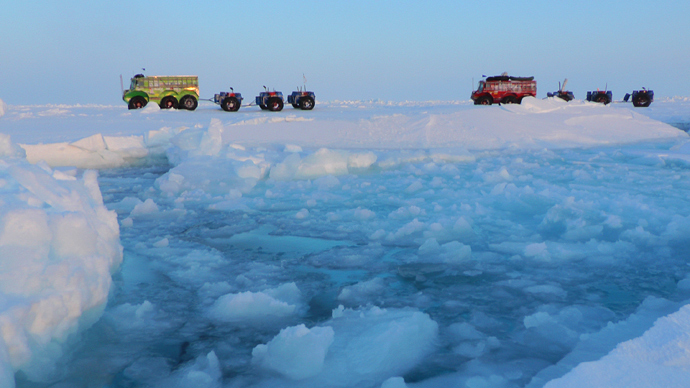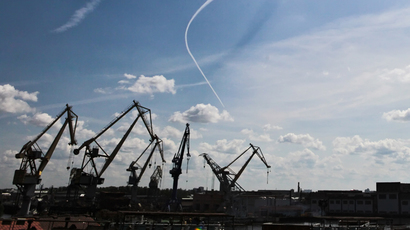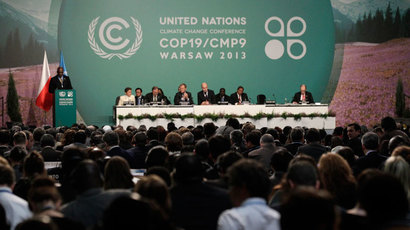Canada to include the North Pole in its claim for Arctic territory, resources

Canadian officials confirmed Monday that the nation is preparing to include the North Pole as part of its Arctic Ocean seabed claim in the multi-country push to prove jurisdiction over further territory in the resource-rich area.
Canadian Foreign Affairs Minister John Baird and Arctic Council chair Leona Aglukkaq officially announced Monday Canada’s claim to the extended continental shelf in the Arctic. It was reported by The Globe and Mail last week that Prime Minister Stephen Harper requested a government board charged with assessing Canada’s claims beyond its territorial waterways, per United Nations rules, to seek a more expansive stake of Arctic area to include the North Pole.
"We have asked our officials and scientists to do additional work and necessary work to ensure that a submission for the full extent of the continental shelf in the Arctic includes Canada's claim to the North Pole," Baird said during a press conference at the House of Commons.
Pursuant to its status as a signatory to the UN Convention on the Law of the Sea, Canada submitted Friday only a partial application to the UN Commission on the Limits of the Continental Shelf showing scientific evidence that it should be able to assert its privileges over territory and resources - namely oil and gas rights - within waterways well beyond its borders. Under the Convention, a nation can claim up to 200 nautical miles of seabed beyond its territorial markers. A country can demand 350 nautical miles if it can prove a natural extension of its land area. The UN requires comprehensive mapping evidence to justify any declaration of rights.
The preliminary application outlines complete scientific evidence regarding Canada’s Atlantic Ocean requests and a portion of its Arctic claim all while reserving the nation’s right to make further submissions at a later date.
Canada’s application was due based on UN requirements that a country that has ratified the Convention make its claim within ten years. Canada ratified the UN Convention in 2003.
The North Pole is 817 kilometers north of Canada’s - and the world’s - northernmost settlement, Alert, Nunavut. The town is home to a Canadian Forces station and Environment Canada station.
"Fundamentally, we are drawing the last lines of Canada. We are defending our sovereignty," Aglukkaq said, according to CBC News.
Resources bring competition
Canada has spent nearly US$200 million on the scientific-discovery process of the area, including dozens of icebreaker and helicopter trips for teams of scientists. An unmanned submarine was used to collect data below the frigid Arctic water. The United States, which is also expected to claim further seabed territory, aided Canada in the research phase, though the US has not ratified the UN Convention yet.
"If the US doesn't ratify, then we don't know what happens if there's a dispute," Rob Huebert, associate director of the Center for Military and Strategic Studies at the University of Calgary, told The Verge. "What do you do about a contested area with the US if there isn't an agreement that governs how that dispute is resolved?"

The US isn’t the only country Canada may clash with its territorial and resource claims. About 90 billion barrels of oil and 1,670 trillion cubic feet of natural gas lie in the largely untapped 18-million-square-mile Arctic region, according to the US Geological Survey, making up about 10 percent of the world's petroleum resources. The dominant portion of these resources are hidden beneath the ice that is shared between five nations bordering the Arctic: Canada, Denmark, Norway, the Russian Federation and the US.
"It's a dangerous and difficult region to drill, but the idea of profits seem to exceed those risks for governments," Huebert said of the volatile Arctic. "We're not seeing anyone pull away."
As for the North Pole, Canada’s bold assertion is less about resources and more about political bravado. The region is not rich in oil or gas reserves. And it will take decades for the UN to decide on Canada’s submissions, as it gets around four every year amid a backlog of over 40 related to other global waterways. In addition, drilling in the Arctic is even further off.
"The North Pole has extreme emotional value; people have an image that's essentially of Santa's workshop," Michael Byers, a professor at the University of British Columbia who is an expert on Arctic sovereignty, told The Verge. "So there's a huge domestic political angle to this, the idea of claiming the North Pole for your country."
Byers said he was skeptical Canada will be able to attain solid proof it’s looking for - if it hasn’t already during its Arctic research - on the North Pole. The push will likely put Canada at odds with Russia and Denmark, he said, as no government has political sovereignty over the North Pole.
"An overly ambitious application creates problems with Russia. And there's no reason to create problems with Russia," Byers said. "But it's a well-known fact that a lot of politicians don't look beyond the next election."
Prime Minister Harper has championed in the past Canadian sovereignty in the Arctic. And senior Canadian officials told The Globe and Mail he is not ready to concede the North Pole territory to either Russia or Denmark, as both countries will likely also make claims to the area.
Both Russia and Canada say the resource-abundant Lomonosov Ridge, below the ocean and close to the geographic North Pole, is a natural extension of their continental shelves.
Russia is currently working to present new mapping data to the UN after a previous claim proposal failed for lack of evidence. Russia claimed territory up to the North Pole in a 2001 submission to the UN, but the application was rejected.
In 2007, a Russian submarine planted a Russian flag on the seabed at the North Pole.
“As for the Arctic, there are not only large economic interests for the country – a huge amount of mineral resources, oil and gas,” Russian President Vladimir Putin said last week, underlining his nation’s interests in the region. “But there lies a very important part of our defense capabilities.”
Yet Putin noted that he does not want to “escalate” the tensions over the Arctic. “I generally proceed from the fact that we will never have any conflicts on such global scale, especially with such countries as the United States. On the contrary, we need to develop cooperation, partnership.”
The economic potential of the Arctic region has gained the recent attention of top US officials, as well.
US Defense Secretary Chuck Hagel said in November the Arctic was “going to give many new opportunities to countries, to the world, that will come with new challenges as well. So the United States needs to be very active in this group and be very involved.”














